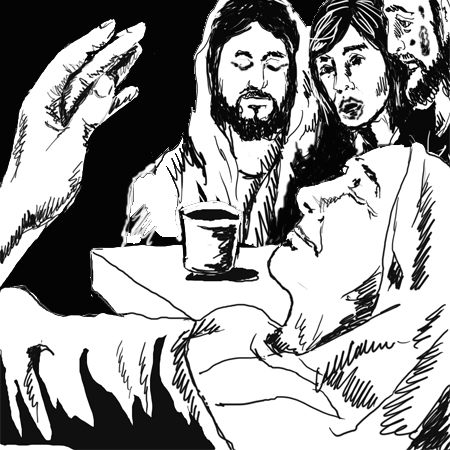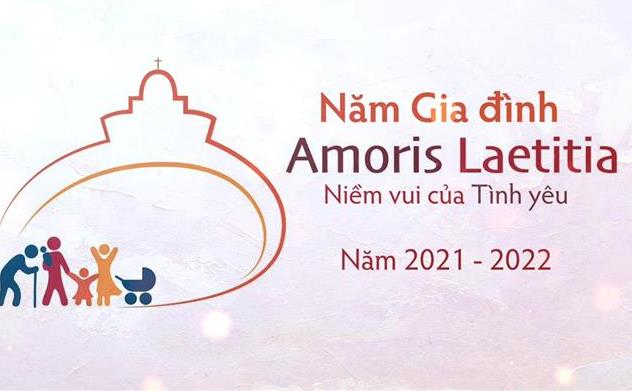 5 Sunday of the Year B
5 Sunday of the Year B
Job 7:1-4’ 6-7; l Cur 9:16-19; 22-23; Mk 1:29-39
Introduction: This is a homily/Scripture reflection in a book, titled: ‘Every Week God Speaks We Respond’, Cycle B, intended to be published in the future by Reverend John Tran Binh Trong.
It was published in Vietnamese in the US 2008 and republished in Viet Nam 2011. To keep the author’s writing style, this homily has not been edited and may not be by a hired hand. However, if readers would like to point out mistake(s) in spelling and grammar and/or to suggest English phrases and expressions, it would be greatly appreciated by the author, whose English is not his mother tongue and who did not live in the US until his adulthood. Passive sentences are used intentionally in this context as to avoid using the first personal pronoun ‘I’ when applicable. That might be associated with any idea of egotism, in accord with the French saying, known as: ‘Le moi est haissable’ (The ego is detestable).
When we are getting older, the human body is hardly able to adapt to certain food, drink, and external conditions. As a result, the body develops different kinds of sickness and disease. Thus, we can identify with people in today’s Gospel, including the mother-in-law of Simon Peter, who are surrounding Jesus, asking to be healed. The Gospel tells us Jesus came not only to free people from sin and death, but also to heal many who were sick with various diseases and he drove out many demons (Mk 1:34), that is to bring freedom to people.
God uses many different ways to heal human sickness and diseases. He relies on doctors, dentists, psychiatrists and nurses as his instruments to heal sickness and diseases along with medicine. As Christians, we believe that God can heal us directly, without human intervention, without the use of medicine and all the technology we have. We call that miracle.
Sometimes God does not heal immediately. He heals gradually to test our patience. Other times God wants us to cooperate with his healing process, to show us how to take care of our body by eating and drinking, sleeping properly and moderately and taking good exercise. The problem here is things do not always work out that way. Many people have gone to the doctor often, stayed in the hospital for treatment for long, prayed constantly, yet their sickness and diseases did not ease up.
So where is the answer? Is that the way that God uses to punish man for his sin? The Old Testament seems to suggest so, i.e., the tragedies that happened to the chosen people were considered as punishment for their sins. Buddhism blames it on karma: a person does bad things in this life; he/she has to suffer in the next. Karma in Buddhism is similar to the meaning of the Vietnamese proverb: The fathers have eaten salty food, their children are thirsty. One thing different is in Karma, the same individual has to suffer in samsara, the round cycle of birth and death and reincarnation. In the proverb of father’s salty food and son’s thirst, father and son are two different individuals: father has blood relation with son, but not a son.
The meaning of the Vietnamese proverb is similar to the meaning of a proverb, which people circulated in Israel: The fathers have eaten green grapes; their children’s teeth are set on edge (Jer 31:29; Ez 18:2). To correct that notion of the green grape proverb, God told the two prophets Jeremiah and Ezekiel to blame the Israelites for circulating that proverb and teach them that each generation or each individual is responsible for the conducts of that generation or individual (Jer 31:30; Ez 18:3). The meaning of the Israelite proverb is only correct when applying to certain hereditary diseases based on physiological reasons.
In Judaism and Christianity, sin does not explain all. Sin does not explain why people have to suffer physically. The Book of Job testifies that. Job complained about the misfortunes of his life such as the loss of his wife, children and possessions (Jb 7:1-4, 6-7). His friends thought those misfortunes were God’s punishment for his sins. However, Job could not accept that explanation since he lived a good life and felt his conscience was clear. The reason must be something else, something that we do not understand or have not yet understood in this life. We do not understand why good and just people have to suffer. Nor do we understand why some innocent children have to suffer from illness and disease either,
As Christians, we must believe that God can heal us from sickness and diseases, if that is good for our soul. However, our faith is not a faith in the restoration of physical health only. From a certain point of view, we are like animals and plants, going through a life cycle of birth, growth, disease, aging and death. Physical healing is our wish and joy and we must pray for it.
However, that is not the most important thing in our list of desire and wish. Jesus came with the main purpose to heal our spiritual sickness that is to liberate us from sin in order to restore our spiritual wellbeing by reconciling us with God. That is the reason why sometimes we pray for a physical healing, yet we receive a spiritual healing without our being aware of it.
In some circumstances, the sickness might be beneficial for our spiritual life, keeping us dependent on God. If a physical health is restored, people might be mistaken in thinking that their spiritual life is good, without blame. For our spiritual benefit, God might want to delay his healing process. If God grants his grace of healing right away, we might forget his gift quickly, might not appreciate his favor and might not want to be dependent on him.
That is the reason why in today’s Gospel, Jesus left and went off to a deserted place where he prayed (Mk 1:35). He also went into their synagogue, preaching the good news and expelling demons (Mk 1:39). There had to be some people, who remained in their sickness and in need of healing, yet Jesus still left them. The reason was Jesus had another important mission to fulfill that is to preach the good news of salvation, to bring healing not only to the body, but also to the soul. He did not use his power to save him from suffering and death either. Jesus accepted suffering and death because he was aware of the value of suffering and death for the love of God and for the salvation of soul.
For practical application, the attitude we should have is, when we are sick, we need to go to the doctor and take medication. At the same time, we need to pray to God for healing.
However, as long as we still carry within ourselves sickness and disease, we pray for strength to accept it and to endure it. We accept sickness and disease not as an end without escape. We offer to God our sickness, disease, suffering and cross for the love of God as to share in Jesus’ suffering and cross. That is salvific and redemptive suffering. That is the way of acceptance that can bring peace and grace to our soul. A certain priest often prayed, asking the Lord not to let him be bedridden lest he should become a burden to those who take care of him.
Prayer for restoration to health:
Oh Lord, our God! We thank you for your coming
to heal us spiritually and physically.
Send your healing power
to the sick and suffering of our times.
Enlighten the mind of doctors and scientists
so that they may discover medicine to heal the sick.
Send your healing power upon us also
in body, soul, mind and spirit
so that we may serve you and humankind
in freedom and with joy. Amen.
John Tran Binh Trong



 Every Week God Speaks – We Respond, Cycle A was published Online in the US. The introduction of the book is recorded at “Sách của Tác giả Chủ trương, Column 1.
Every Week God Speaks – We Respond, Cycle A was published Online in the US. The introduction of the book is recorded at “Sách của Tác giả Chủ trương, Column 1.

 Năm Mục Vụ Giới Trẻ 2021. HĐGM ấn định một chương trình Mục vụ Giới trẻ 3 năm với các chủ đề tương ứng: Năm 2020: Đồng hành với người trẻ hướng tới sự trưởng thành toàn diện.
Năm Mục Vụ Giới Trẻ 2021. HĐGM ấn định một chương trình Mục vụ Giới trẻ 3 năm với các chủ đề tương ứng: Năm 2020: Đồng hành với người trẻ hướng tới sự trưởng thành toàn diện. Năm Thánh Giu-se: Nhân kỷ niệm 150 năm Đức Giáo hoàng Pio IX chọn thánh Giuse làm Đấng Bảo Trợ Giáo Hội Công Giáo, Đức Phanxicô đã ban hành Tông thư “Patris corde” – Trái tim của người Cha – và công bố “Năm đặc biệt về thánh Giuse” từ
Năm Thánh Giu-se: Nhân kỷ niệm 150 năm Đức Giáo hoàng Pio IX chọn thánh Giuse làm Đấng Bảo Trợ Giáo Hội Công Giáo, Đức Phanxicô đã ban hành Tông thư “Patris corde” – Trái tim của người Cha – và công bố “Năm đặc biệt về thánh Giuse” từ  Năm “Gia đình Amoris Laetitia” 2021 về “Vẻ đẹp và niềm vui của tình yêu gia đình” do Bộ Giáo Dân, Gia Đình và Sự Sống tổ chức, được Đức Phanxicô khai mạc dịp Lễ Thánh Giuse
Năm “Gia đình Amoris Laetitia” 2021 về “Vẻ đẹp và niềm vui của tình yêu gia đình” do Bộ Giáo Dân, Gia Đình và Sự Sống tổ chức, được Đức Phanxicô khai mạc dịp Lễ Thánh Giuse 
